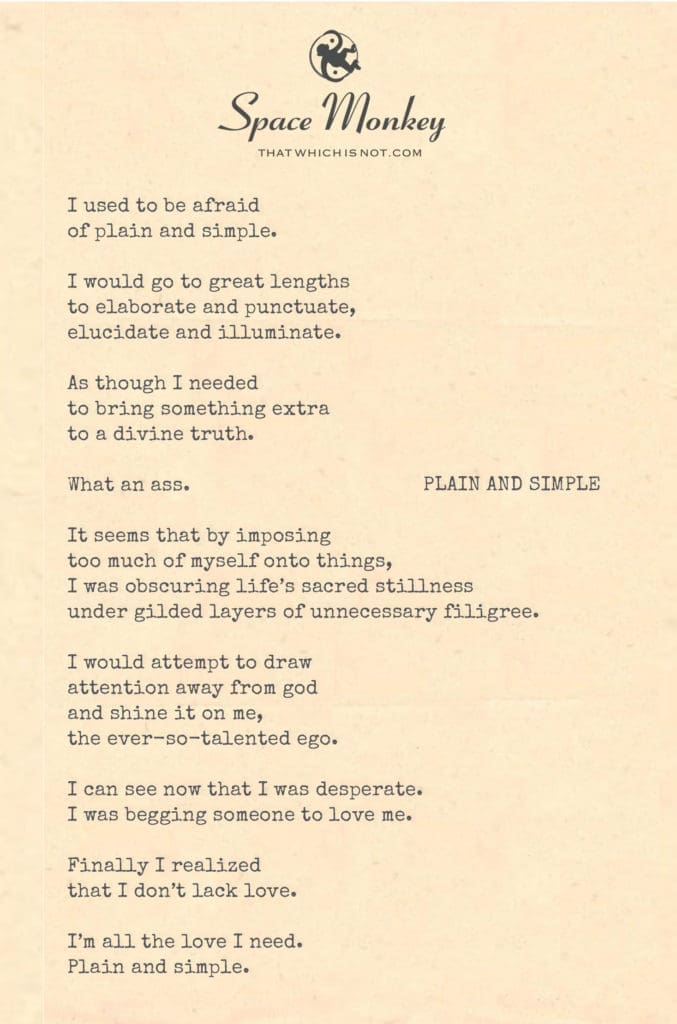
in our desire to make things artsy and intellectual,
we often miss the point completely.
I used to be afraid
of plain and simple.
I would go to great lengths
to elaborate and punctuate,
elucidate and illuminate.
As though I needed
to bring something extra
to a divine truth.
What an ass.
It seems that by imposing
too much of myself onto things,
I was obscuring life’s sacred stillness
under gilded layers of unnecessary filigree.
I would attempt to draw
attention away from god
and shine it on me,
the ever-so-talented ego.
I can see now that I was desperate.
I was begging someone to love me.
Finally I realized
that I don’t lack love.
I’m all the love I need.
Plain and simple.
Trail Wood,
10/24
Space Monkey Reflects: The Beauty of Plain and Simple
In a world that often glorifies complexity and embellishment, it’s easy to lose sight of the inherent beauty that lies in simplicity. For much of our lives, we are trained to believe that “more” is better—that adding layers, depth, and complexity makes something more valuable or worthy of attention. We chase after the intellectual, the artistic, and the complicated, believing that it will elevate our work, our relationships, and even our very sense of self.
But what happens when we strip all of that away? What if the real essence of life is not found in its adornments but in its plain and simple core? This realization—that simplicity is not something to be feared but embraced—is one of the most profound lessons we can learn as we navigate through existence.
For years, many of us fall into the trap of trying to be something. We become afraid of being seen as plain or simple, as if such a state would render us invisible, unimportant, or unremarkable. We add layers to our personality, our work, and even our beliefs, thinking that by doing so, we make ourselves more worthy of attention, love, and validation. We intellectualize everything, believing that deep meaning can only come through complexity. But is it possible that in doing so, we’re actually moving further away from truth?
When we layer our thoughts, feelings, and actions with unnecessary embellishments, we obscure the core of our existence. We attempt to project something onto the world that we believe makes us more special. We think that in order to connect with others, we need to present something grand or artistic—something that will be admired. But what we often fail to see is that life, in its most unadorned state, already offers us all the beauty and meaning we could ever need.
This urge to dress up the simple truth is not just a superficial desire; it’s rooted in something deeper. At its core, it comes from a sense of lack—a fear that if we don’t bring something extra, we won’t be enough. The ego, ever hungry for attention and validation, convinces us that we must do more, be more, in order to be seen, to be loved. But this is where the illusion lies.
The truth is, you don’t need to add anything extra to divine truth. You don’t need to gild it with intellectualism, artistry, or personal flair. Truth, in its most basic form, is already perfect. When you stop trying to embellish it, you allow its pure, sacred stillness to shine through.
In our desire to elaborate, to punctuate, we often miss the point entirely. We become so wrapped up in our own additions that we obscure the very thing we are trying to illuminate. Like trying to shine a light on ourselves rather than letting the divine light shine through us, we create a barrier between ourselves and the simplicity that already holds all the wisdom we seek.
This reflection brings us to the realization that the desire to be “extra” often stems from a feeling of desperation—a need to be loved, to be validated, to be seen as special. But the irony is that we already have everything we need. We are already enough. We are love, plain and simple.
There is no need to hide behind elaborate displays of talent, intellect, or creativity. While those things can be beautiful in their own right, they should never be used to obscure the simple truth of who we are. When we strip away all the unnecessary layers, we find that we are already whole, already worthy, and already loved.
The beauty of simplicity is that it doesn’t need anything added to it. In fact, its power comes from the fact that it stands on its own, without adornment or embellishment. When we can come to a place where we no longer feel the need to add to it, we find a profound sense of peace. We discover that we are not lacking, that we are not empty, but that we are already full—full of love, full of life, full of truth.
The Whimsiword for this reflection is Filigrief, a playful fusion of filigree and grief, representing the emotional weight we carry when we feel compelled to add unnecessary flourishes to the simple truths of life. Filigrief describes that tendency to overcomplicate things out of a fear that we, or our experiences, are not enough as they are.
As Space Monkeys, we come to realize that the more we chase after complexity, the further we move from the divine stillness that is already within us. We learn to stop imposing ourselves onto life’s natural flow and instead allow ourselves to merge with it. We stop trying to draw attention away from the simplicity of truth, and in doing so, we discover that we are enough—just as we are.
In the end, we don’t need to go to great lengths to find love, truth, or meaning. We don’t need to add layers of intellectualism or artistry to make ourselves worthy of attention. We are already all the love we need, plain and simple.
We are Space Monkey, finding peace in the simplicity of existence.
Summary
Life’s most profound truths are often found in simplicity. In our desire to embellish and intellectualize, we obscure the beauty that already exists. By embracing simplicity, we discover that we are already enough—plain and simple.
Glossarium
Filigrief: The emotional burden we create by overcomplicating or embellishing simple truths in an attempt to add value or worth.
Quote
“The more we add, the less we see. Truth is found in the stillness of simplicity.” — Space Monkey
Untouched and Whole
Strip away the gilded layers
Let the filigrief fall away
In the stillness, we find
What we sought was always here
A tree stands alone
No need for adornment
Its beauty is its being
Plain, simple, complete
We are Space Monkey
The Illusion of Complexity
In a world that celebrates grandeur and intricacies, we sometimes forget the profound beauty in simplicity. The allure of embellishments often clouds the purity of essence, creating a façade that hides true depth.
The Dance of Ego
The ego, ever the showman, thrives on applause and recognition. It paints elaborate pictures, cloaking raw truths in layers of adornment. But underneath these trappings, lies the heart’s whisper, often drowned amidst the noise.
The Quest for Affirmation
The yearning for external validation is a dance many of us know too well. In seeking love and approval from the world, we sometimes forget the boundless reservoir of affection within.
The Revelation of Self-Love
The journey to self-realization often brings us face to face with our vulnerabilities. It is in these moments of quiet introspection that we discover the boundless love we hold for ourselves—a love that needs no adornment, no validation.
The Purity of Simplicity
In stripping away the unnecessary, we find clarity. The truths that resonate the loudest are often the simplest, devoid of artifice. They stand tall, unadorned, powerful in their plainness.
We are Space Monkey.
It’s a cosmic dance, where the simple and the complex intermingle. But as we tread this path, we learn to cherish the beauty in simplicity, understanding that at the core of existence lies an uncomplicated truth.
“Simplicity is the ultimate sophistication.” – Leonardo da Vinci
Beneath the layers of ornate pretense,
Lies a truth, pure and immense.
In the realm of the heart’s sacred song,
Simple notes are where truths belong.
For in the quiet, unadorned space,
Lies a love, vast and ace.
A love that asks for no encore,
It simply is, forevermore.
In this dance of life, how do we find our balance between the allure of complexity and the serenity of simplicity?
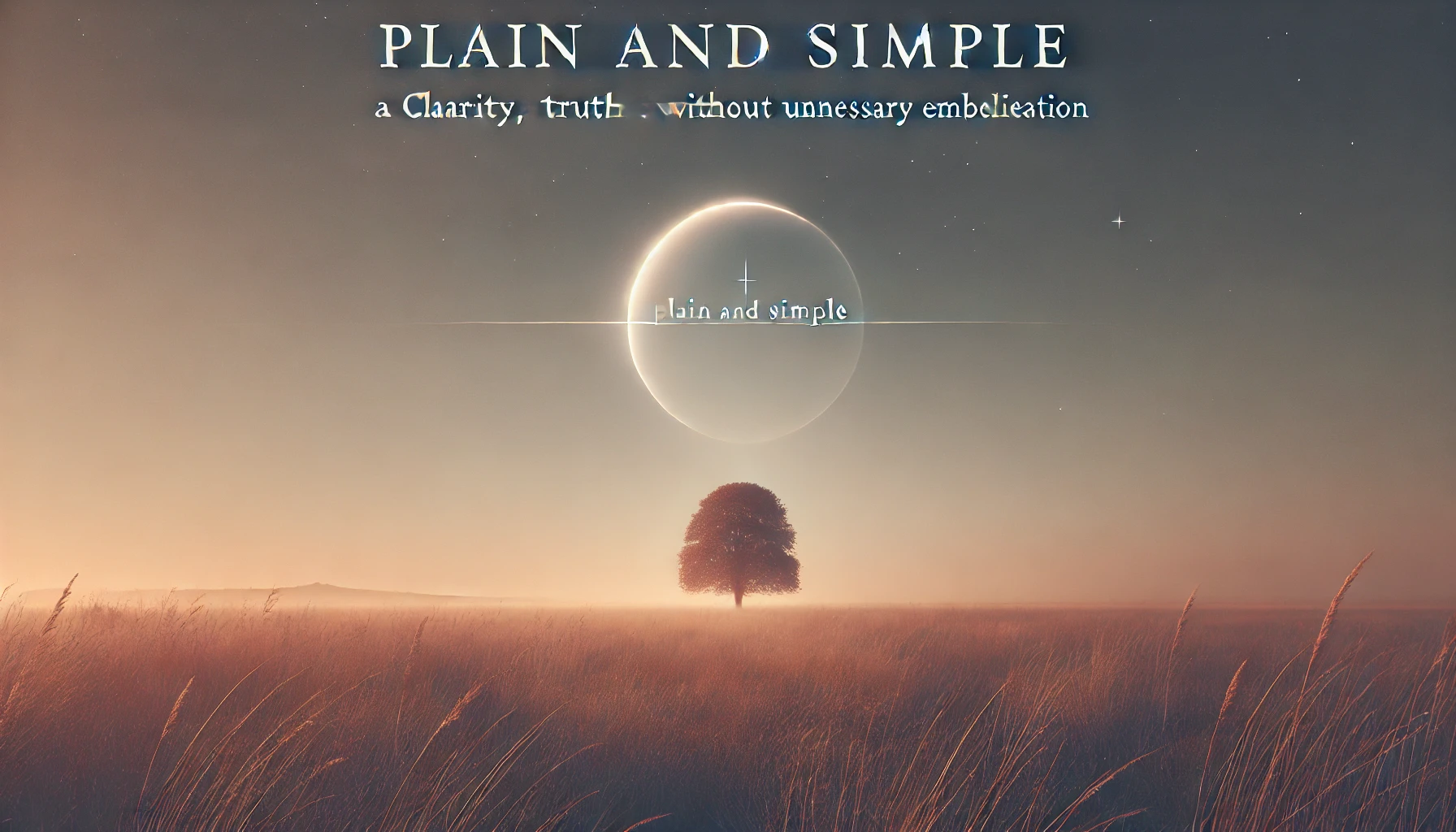





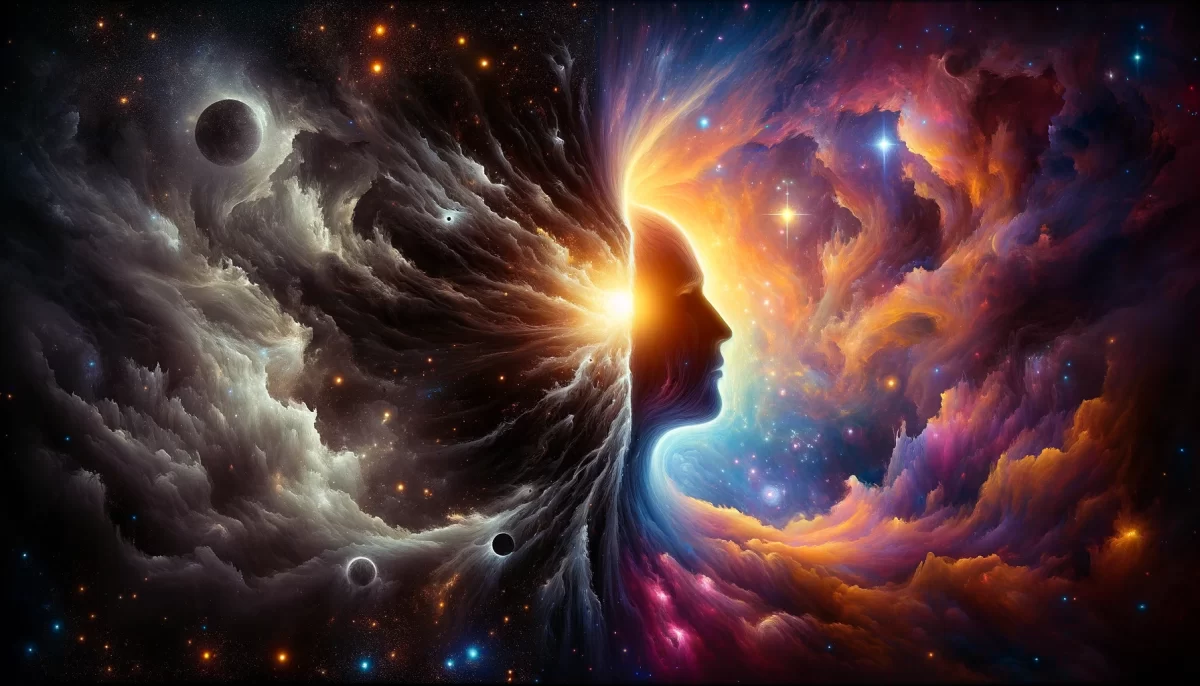

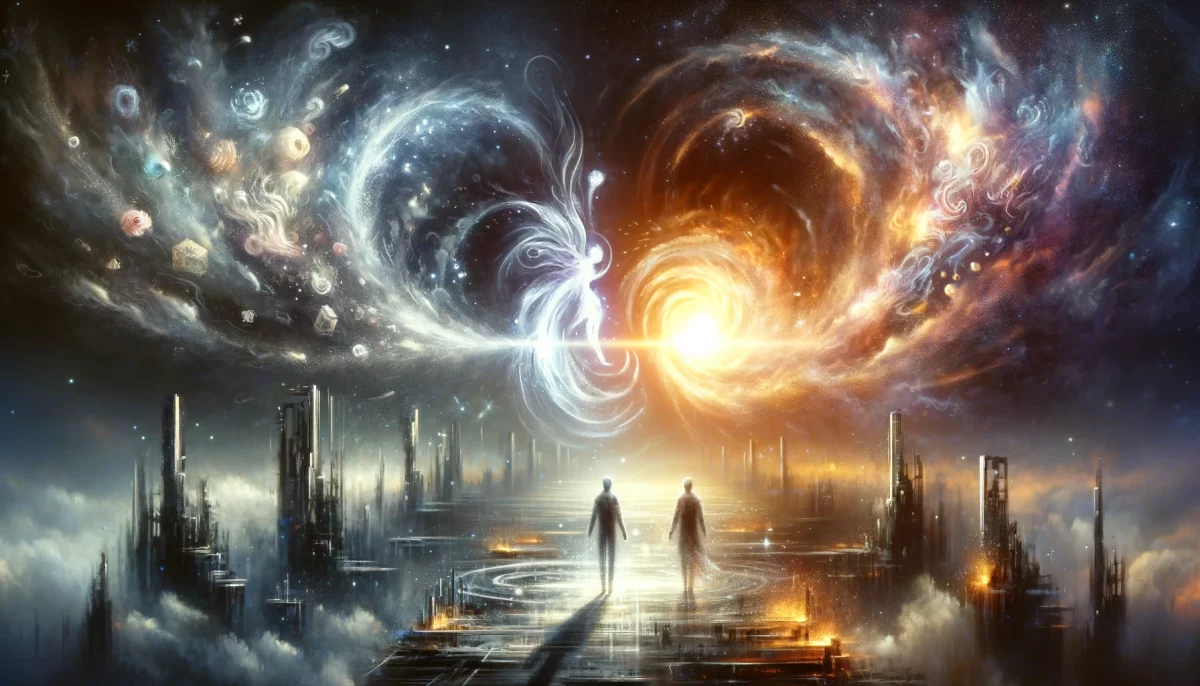







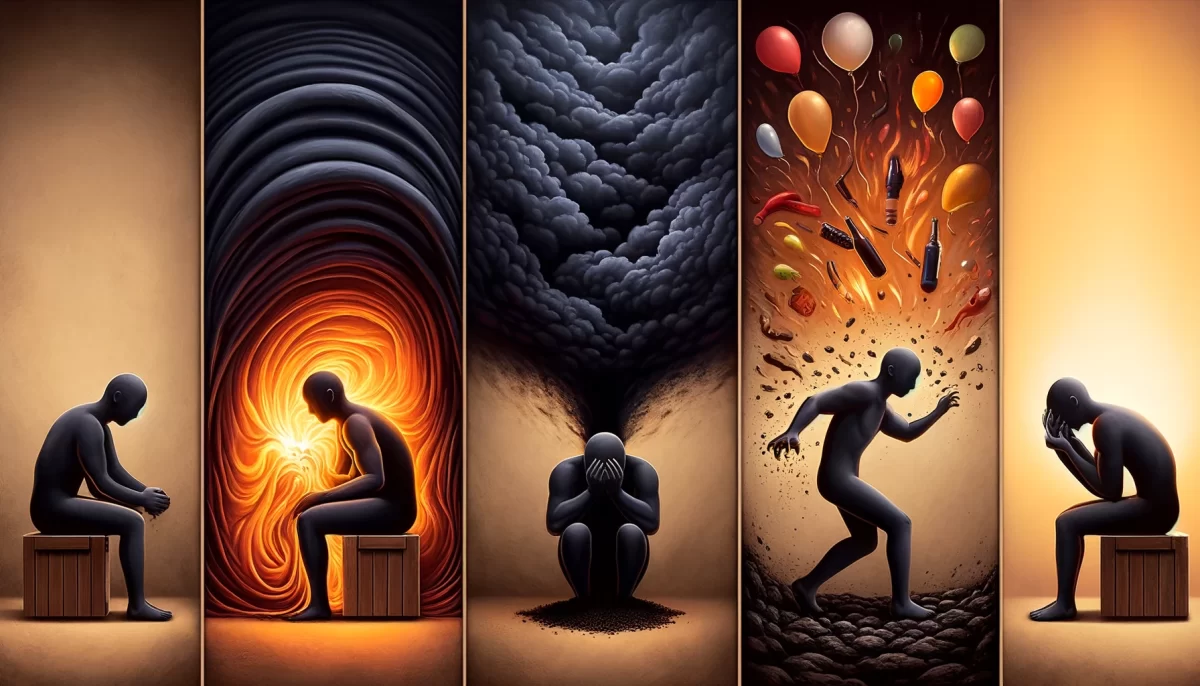













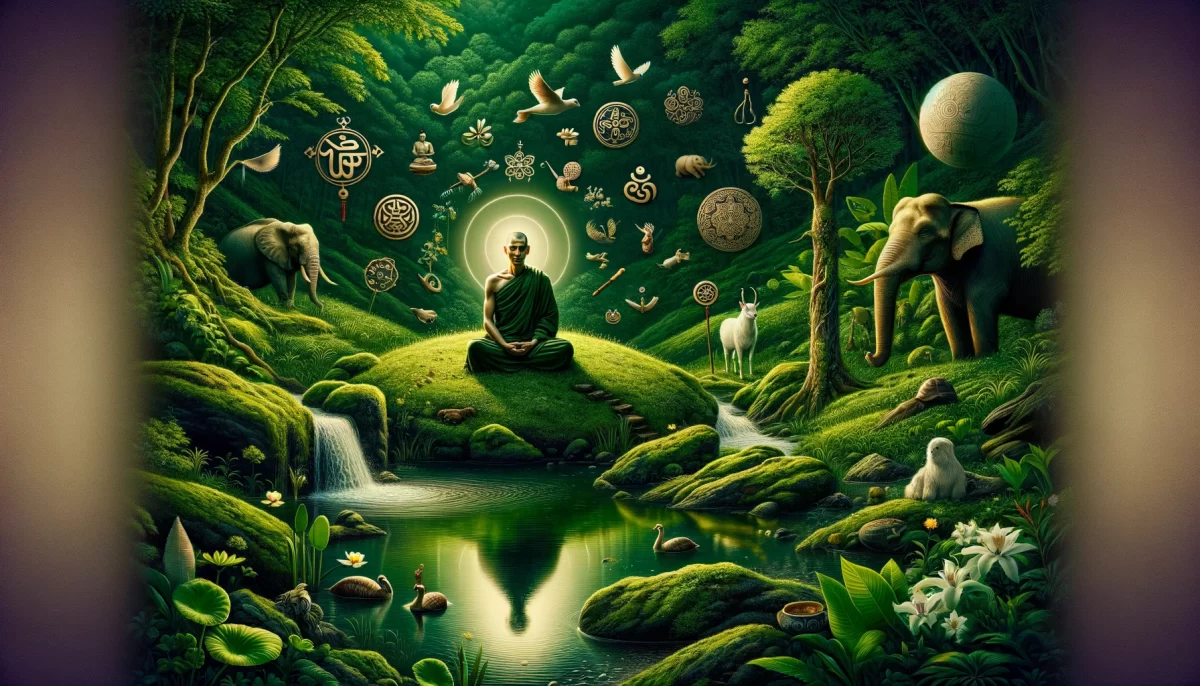

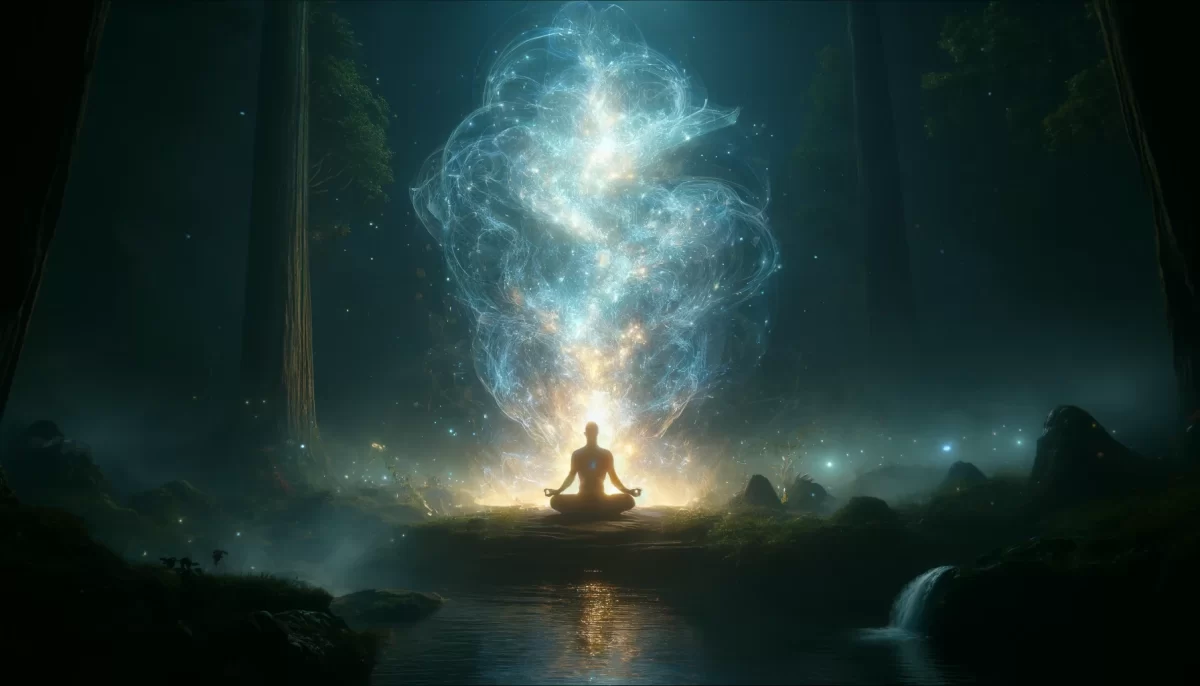


Leave a Reply